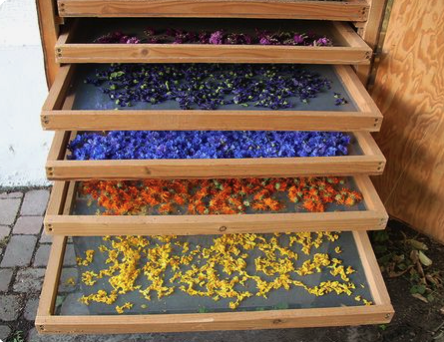
The Art of Drying Medicinal Herbs: From Small-Scale to Commercial Production
Herbs have been used for medicinal purposes for centuries, and their effectiveness depends greatly on the quality of the herbs used. One crucial aspect of preserving the potency and flavour of medicinal herbs is the drying process. Whether you’re an avid gardener with a small herb garden or a commercial producer, understanding the best practices for drying herbs can make all the difference. In this blog post, we will explore the best methods for drying medicinal herbs on both small and commercial scales, ensuring that you can enjoy the full benefits of your herb harvest.
Drying Medicinal Herbs on a Small Scale:
Harvest at the Right Time: The potency and flavour of medicinal herbs are at their peak just before they start to flower. Therefore, it’s important to harvest your herbs early in the day, once the morning dew has dried but before the sun gets too hot.
Gentle Cleaning: Remove any dirt or insects from the herbs by gently shaking them or using a soft brush. Avoid washing the herbs unless absolutely necessary, as excess moisture can prolong the drying process.
Air Drying: One of the simplest and most effective methods for drying herbs on a small scale is air drying. Bundle small quantities of herbs together and hang them upside down in a well-ventilated, dark room. Make sure to choose a location away from direct sunlight, as it can degrade the herbs’ essential oils and medicinal properties. This method may take anywhere from a few days to a few weeks, depending on the moisture content of the herbs and the ambient humidity. This method is ok for a home grower but has little value in commercial production.
Drying Racks or Screens: This is the preferred method if you are wanting to dry herbs to sell. Lay the herbs on drying racks or screens in a single layer. This method works well for herbs with delicate leaves or flowers that might lose their shape if hung. Turn the herbs occasionally to ensure even drying. It is relatively inexpensive and will give good results.
Dehydrators: If you frequently dry herbs or have a large harvest, investing in a food dehydrator can be a practical solution. Set the dehydrator to the lowest temperature (around 95°F or 35°C) and place the herbs on the trays in a single layer. This method provides consistent airflow and temperature control, ensuring even and efficient drying.
Drying Medicinal Herbs on a Commercial Scale:
Preparing the Harvest: As with small-scale drying, harvesting at the right time and gently cleaning the herbs are crucial steps. However, on a commercial scale, it’s important to have an efficient harvesting and cleaning process in place to handle larger volumes of herbs.
Controlled Drying Environment: Commercial drying often involves the use of drying rooms or specialised drying equipment. These environments allow for precise control of temperature, humidity, and airflow. By optimising these factors, herbs can be dried more quickly and with minimal loss of potency.
Quick Drying Methods: In commercial operations, time is of the essence. Therefore, various techniques like forced-air drying, microwave drying, or freeze-drying are often employed to expedite the drying process. These methods can reduce drying time significantly while preserving the herbs’ medicinal qualities. However, they require specialised equipment and expertise.
Quality Control: Commercial producers must conduct regular quality control checks to ensure that the herbs are properly dried and retain their potency. Monitoring moisture levels, inspecting for mould or pests, and maintaining strict hygiene practices are essential to deliver high-quality medicinal herbs to consumers.
Whether you’re drying medicinal herbs on a small scale or as part of a commercial operation, the goal remains the same: to preserve the potency, flavour, and medicinal properties of the herbs. By following the appropriate drying methods, you can achieve optimal results in both scenarios. Remember to harvest at the right time, handle herbs with care.



